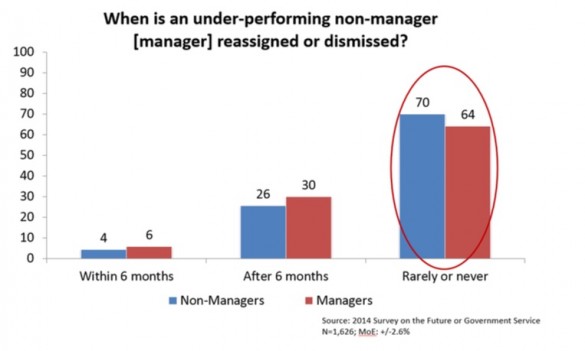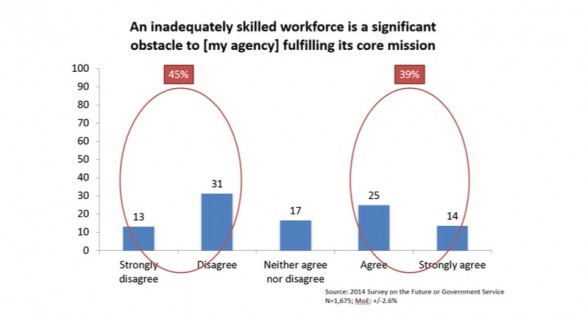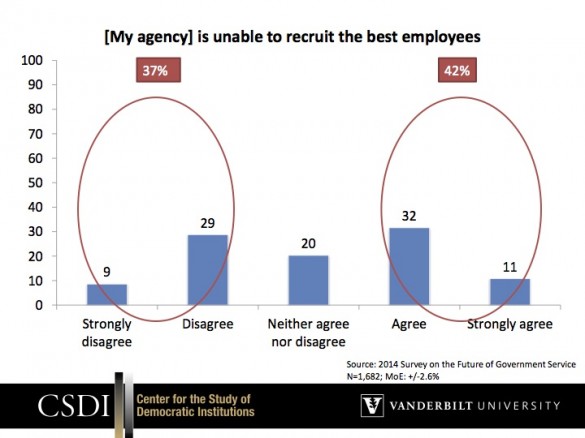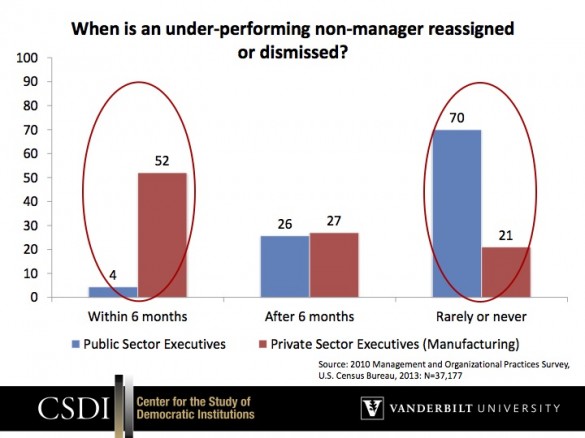In a new survey, a third of federal executives told Vanderbilt University researchers that the workforce lacks the skills to get the job done and underperforming employees can rarely be dismissed.

“It’s time to do civil service reform,” said David E. Lewis, William R. Kenan Jr. Professor of Political Science at Vanderbilt University and lead researcher on the Survey on the Future of Government Service. “I worry that it will be done in piecemeal fashion in response to a crisis rather than the right way, which is to develop a modern-day human resources system for a modern government.”
Scandals involving federal institutions have not been uncommon in recent years, whether it’s the response of the Federal Emergency Management Agency during Hurricane Katrina in 2005 or long waiting lists for treatment at Veterans Administration hospitals. It may be possible to avoid more dysfunction if the results of the survey, done by Vanderbilt’s Center for the Study of Democratic Institutions, are heeded. The Survey on the Future of Government Service was sponsored by the Center for the Study of Democratic Institutions at Vanderbilt University with the cooperation of Princeton University and the Volcker Alliance. It has a margin of error of plus or minus 1.8 percentage points.
Lewis and Vanderbilt political science doctoral candidate Mark D. Richardson sent out 14,698 surveys to federal executives last year, after the executives received a letter from former Federal Reserve Chairman Paul Volcker endorsing the survey. Granted confidentiality, 3,551 federal executives (a response rate of 24 percent) gave frank feedback about the state of the federal workforce, their own training and expertise and their power to address personnel issues.

“Federal spending has quadrupled since 1960,” Lewis said. “The number of federal employees today is actually slightly less than 1960. We are asking federal employees to do more and manage four times as much.”
Although liberals and conservatives may differ on how large the federal government should be, all can agree that it should function effectively, Lewis said.

“The discourse on public service tends to be should government do this or do that, or should it be smaller?” Lewis said. “But real problems exist for the kind of things everybody agrees government should be doing.”
Among the survey findings:
- Seventy percent of underperforming non-managers and 64 percent of underperforming managers are rarely or never dismissed;
- Thirty-nine percent of federal executives agree or strongly agree that an inadequately skilled workforce is a significant obstacle to their agency fulfilling its core mission. Forty-five percent disagree or strongly disagree;
- Fifty-one percent of federal executives said the skills of the workforce in their agency had gotten better or much better during their tenure, while nineteen percent said skills had gotten worse or much worse. The rest said the skills were the same;
- Forty-two percent of federal executives agree or strongly agree that they are unable to recruit the best employees. Thirty-eight percent disagree or strongly disagree;
- Only fifty-five percent of eligible respondents agree or strongly agree that they want to join the ranks of the Senior Executive Service or become a Senior Professional;
- Twenty-four percent of career executives and thirty-five percent of political executives say it is likely or very likely they will leave their agency in the next 12 months;
- Employers outside their agencies have approached 39 percent of federal executives about a job since July 1, 2013;
- Only 68 percent of federal executives and 45 percent of those who are political appointees believe they have received sufficient training and guidance on how to hire, promote, reward, discipline and dismiss employees in the career civil service;
- Eighty-three percent of political executives and seventy-two percent of career executives agree or strongly agree that they would recommend that a young person work in public service today; and
- Those that believe merit determines promotions and under-performers are reassigned or dismissed are more likely to recommend public service.

“Look, the survey results show that some agency workforces are very skilled and others are really struggling. The federal government needs to spend some time looking at why some federal agencies are doing well and some are doing poorly, and share best practices,” Lewis said. “Right now they underinvest in this kind of activity. There is no modern human resources management like you see in the best private sector firms.”

“The second thing is we need to free up managers to reward merit,” he said. “We need to make it possible to hire the best people, reward and promote the best people and then retain the best people.”
The human resources function of the federal government should be equal to the importance of the challenges facing it, Lewis said.